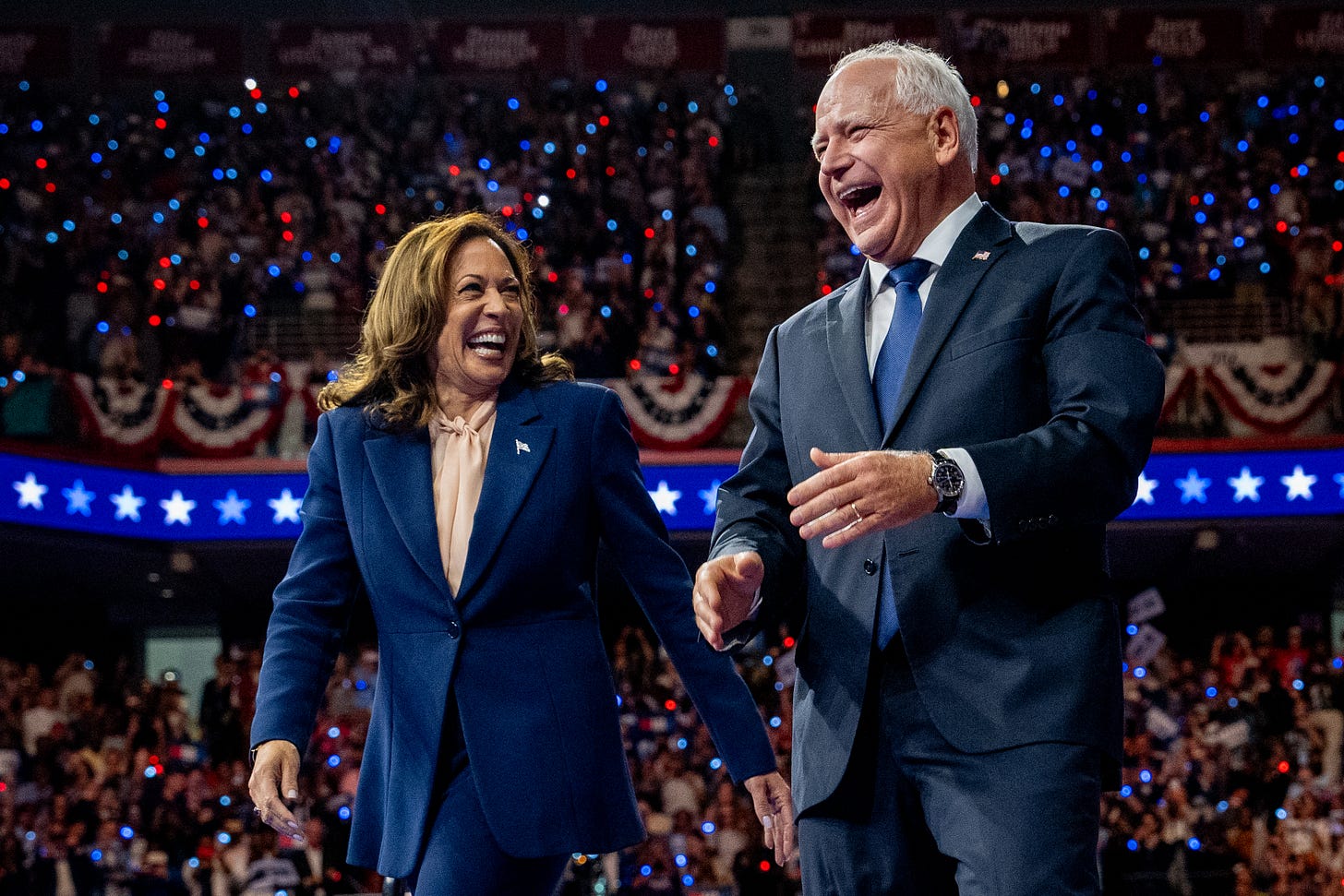Kamala Harris's inspired choice
Democrats often use their running mate to pivot to the center. But not this time.
🚨 This all-free, five-edition week of PN is made possible by paid subscribers 🚨 If you aren’t one already, please sign up to support our independent journalism.
Kamala Harris’s choice of Minnesota Gov. Tim Walz as her running mate is, in some respects, a standard, safe choice. Like most of her potential picks, Walz is a white man. He’s a popular Democratic governor with deep roots in the party. He’s by no means an odd or risky selection.
And yet, at the same time, Harris’s choice of Walz is unusual, exciting, and even inspirational. Over the last forty years, Democrats have generally used the VP pick to try to cater to centrist swing voters. Some of Harris’s leading choices, like Pennsylvania Gov. Josh Shapiro and Arizona Sen. Mark Kelly, were in that mode.
Instead, Harris chose Walz — a candidate who has a good deal of potential bipartisan appeal, but who is also well-positioned to excite Democrats, and particularly progressives. As such, Walz’s rise is a promising indication that Harris plans to continue and expand upon the approach of President Biden, who’s embraced progressive ideas and legislation as a way to unify and inspire Democratic voters.
Walz as safe pick
It’s easy to make the case for Walz as a safe, sturdy, and conventional pick for VP. He served in the National Guard for 24 years; he’s now the vice presidential candidate with the longest military career.
In 1996 he left the military to to work as a high school history teacher in Mankato, Minnesota. He ran for Congress in 2006, a strong year for Democrats, and defeated six-term Republican Gil Gutknecht. He held the rural district through 2010 and 2014 — two red wave years — and even held on in 2016, when Trump won the district by 15 points. In 2018, he ran for governor and won. He won a second term in 2022.
This is an impressive record, and one that seems almost custom-made for a vice presidential resume.
Walz’s military record should appeal to at least some conservative voters, who tend to value military service in candidates. His strong record in a rural Trump district also testifies to his ability to reach out to red voters.
A note from Aaron: Working with brilliant contributors like Noah requires resources. If you aren’t already a paid subscriber, please support PN by becoming one.
On the other hand, Walz’s experience as a teacher should play well with educators — a core Democratic constituency — and with teacher’s unions. He’s also shown himself to be exceptionally skilled at attacking Republicans. After he called Republicans “weird” on MSNBC, Democrats as a whole seized on the word to define the abortion-hating, single-women hating, book-hating weirdos in the GOP.
Walz’s conventional qualifications and strengths have made him acceptable within, and popular with, the mainstream of the Democratic Party, as evidenced by the wave of enthusiasm from mainstream party leaders.
Nancy Pelosi, the still powerful former speaker of the House, rushed to praise the choice of her former colleague. So did Illinois governor JB Pritzker. So did conservative West Virginia Democrat turned independent Joe Manchin, and socialist New York Rep. Alexandria Ocasio-Cortez. So did basically everyone else with any status in the Democratic party. Walz is well-liked. He’s a Democrat’s Democrat.
Walz as something new
The thing is, though, that for the last 40 years or so, Democrats like Walz haven’t been chosen for VP. Instead, Democratic presidential candidates have often used their running mate selections to appeal to swing voters and independents — basically, anyone but core Democratic voters and constituencies.
In 2016, Hillary Clinton selected Virginia Sen. Tim Kaine — a swing-state politician with a center-leaning record. In 2008, then candidate Barack Obama picked Biden, a politician who at that point had a record as a centrist compromiser.
In 2000, candidate Al Gore chose Connecticut Sen. Joe Lieberman as his running mate. Lieberman was one of the most conservative members of the Democratic Party; he ended his career at the centrist No Labels party trying to recruit a third party candidate to run in 2024. In 1992, Bill Clinton chose Gore, a fellow southern moderate. In 1988 candidate Michael Dukakis chose Texan Lloyd Bensten, who described himself (no surprises here) as a “moderate.”
There have been a couple of exceptions. In 2004, John Kerry’s VP pick was North Carolina Sen. John Edwards, who positioned himself as a populist focusing especially on poverty issues. And in 2020, Joe Biden chose Kamala Harris, a California senator to his left on most policy issues. But the tendency is clear; Democratic nominees generally try to use a VP pick to win a swing state, or at least to win swing voters.
Harris had the opportunity to make that kind of choice as well. Pennsylvania Gov. Josh Shapiro, on Harris’s short list, is very popular in his purple state. Part of the reason may be that he has taken a lot of purple-ish stances; he’s backed school-voucher programs, which are anathema to teacher’s unions, and he’s called for corporate tax cuts. He’s also joined Republicans in harshly criticizing pro-Palestinian protesters.
Another short list candidate, Arizona Sen. Mark Kelly, was also a moderate swing state politician. He’s opposed pro-labor legislation, and applauded far right Israeli Prime Minister Benjamin Netanyahu during his address to Congress.
Shapiro and Kelly’s centrist positions would not in the past have disqualified them as vice-presidential contenders. On the contrary, those positions make them seem very suited to a slot formerly filled by Joe Lieberman, Lloyd Bentsen, and Tim Kaine.
Instead, though, Harris chose Walz.
Walz Is a Biden Democrat
Walz isn’t a leading left voice in the party, like Bernie Sanders, Elizabeth Warren, or AOC. He’s a mainstream Democrat who has been (stunningly) successful in pushing mainstream progressive Democratic priorities in Minnesota.
After 2022, when Democrats won a narrow majority in the state Senate and House, the legislators and Walz passed a paid family and medical leave bill, banned LGBT conversion therapy, legislated a carbon-free electric grid by 2040, and legalized cannabis. They also restored voting rights to people released from jail, mandated gun background checks, and put in place a free school lunch program for all students, regardless of income.
That record has made Walz a darling of progressives, who have enthusiastically boosted his candidacy. It’s also the kind of record that appeals to all Democrats and makes him look a lot like another leading Democratic figure — Joe Biden.
Biden came into office with a record as a moderate compromiser. He was not the choice of most progressives or leftists, who would have preferred Sanders or Warren in the 2020 primary.
But once in office, Biden embraced a range of popular progressive proposals. Despite Republican (and Supreme Court) resistance, he’s pushed through billions in student debt relief. He managed to pass a bipartisan gun control bill. He passed massive investments in green energy. His administration’s aggressive antitrust enforcement has reversed decades of Democratic timidity in the face of corporate consolidation. His pro-union policies have ignited a major labor renaissance.
Obviously, progressives and the left have serious differences with Biden, most notably on his continued support for Israel’s right-wing government. On many issues, though, Biden has created a new blueprint for Democratic governance — one which builds on progressive ideas and energy to craft a powerful, popular agenda that the entire party can embrace.
In choosing Walz, Harris is signaling that this is a legacy she wants to build on. Rather than using the VP pick to apologize beforehand for Democratic priorities and Democratic values, she has selected Walz, a politician who, like our current president, has a gift for making the case that progressive policies are common sense. Biden pointed a way forward for Democrats and progressives. In choosing Walz, Harris is saying that we are not going back.
That’s it for today
We’ll be back with a special Tuesday edition tomorrow. If you appreciate this post, please support Public Notice by signing up. Paid subscribers make this newsletter possible.
Thanks for reading.







I will miss Walz here in Minnesota, but my family LOVES him. You missed some more things he did, but that’s the point! He did SO MUCH on such slim margins, and did so much good. Just like Biden.
Walz also increased the pay of home health care workers, not the nurses, but the workers who allow elderly and Disabled people to continue to live at their homes and really significantly so. There was such a severe shortage in such workers. In 2018 they made $12 a hour. In 2024 they were bumped to $19, and 2025 it’ll be $20. As someone who’s alive and has family members able to stay home with me and take care of my needs and all my appointments, obviously a huge deal. And the paid sick leave is a game changer in many ways for such home health care workers, who had nothing at all before 2018.
I’m really happy. I am more like Sanders and AOC philosophically but I’ve always been a pragmatic one, more interested in the art of what’s possible.
Biden really surprised me and everyone and happily so with how progressive and focused on dialing back the problems of the last 40 years he became. Better than expected, transformative even. I’m proud of Biden’s courage in letting go of the nomination. I don’t think the Democratic electorate was rejecting him, just… it was in many ways his sole “negative” and the job of administration he is clearly masterful at, politics also, but not also campaigning. Biden is an excellent president and will be remembered so and you can’t ask for more than that.
Very happy to have a confirmation that we will continue to have a progressive administration, in the Biden-Harris-Walz mold. I do hope that Kamala Harris will retain as much Biden administration as possible, not need reinvent wheel for everything. Very impressed with the antitrust action. The one personnel change I would strongly recommend is the DOJ head.
The Democrats have navigated an age dominated by the conservative movement by compromising core parts of the Rights Revolutions of the 20th century. Those gains were built out of a spark in labor activism that influenced marginalized groups to call for their basic human rights. The conservative movement was a reactionary process that demonized government efforts to aid impoverished and otherized Americans by playing to the fears of extremists and supremacists. The Walz pick suggest the Democratic Party is evolving out of the fear they developed in the 1980s after losing the presidency, Senate, and eventually the House in the next decade. American political history exists in coalitional cycles, thus the period that brought us deregulation and excessive privatization has proven inadequate and harmful to sustain democratic priorities. I hope the Democratic Party will support Vice President Harris, because there are still many within it who are fine with the plutocratic status quo that a generation is trying to move away from.